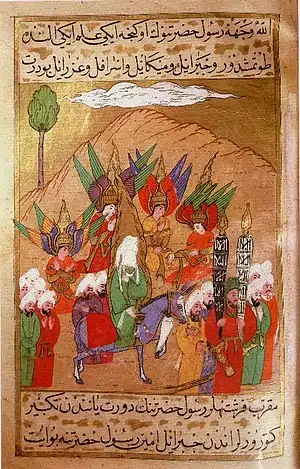630
Year 630 (DCXXX) was a common year starting on Monday (link will display the full calendar) of the Julian calendar. The denomination 630 for this year has been used since the early medieval period, when the Anno Domini calendar era became the prevalent method in Europe for naming years.
| Millennium: | 1st millennium |
|---|---|
| Centuries: | |
| Decades: | |
| Years: |
| 630 by topic |
|---|
| Leaders |
| Categories |
|
| Gregorian calendar | 630 DCXXX |
| Ab urbe condita | 1383 |
| Armenian calendar | 79 ԹՎ ՀԹ |
| Assyrian calendar | 5380 |
| Balinese saka calendar | 551–552 |
| Bengali calendar | 37 |
| Berber calendar | 1580 |
| Buddhist calendar | 1174 |
| Burmese calendar | −8 |
| Byzantine calendar | 6138–6139 |
| Chinese calendar | 己丑年 (Earth Ox) 3326 or 3266 — to — 庚寅年 (Metal Tiger) 3327 or 3267 |
| Coptic calendar | 346–347 |
| Discordian calendar | 1796 |
| Ethiopian calendar | 622–623 |
| Hebrew calendar | 4390–4391 |
| Hindu calendars | |
| - Vikram Samvat | 686–687 |
| - Shaka Samvat | 551–552 |
| - Kali Yuga | 3730–3731 |
| Holocene calendar | 10630 |
| Iranian calendar | 8–9 |
| Islamic calendar | 8–9 |
| Japanese calendar | N/A |
| Javanese calendar | 520–521 |
| Julian calendar | 630 DCXXX |
| Korean calendar | 2963 |
| Minguo calendar | 1282 before ROC 民前1282年 |
| Nanakshahi calendar | −838 |
| Seleucid era | 941/942 AG |
| Thai solar calendar | 1172–1173 |
| Tibetan calendar | 阴土牛年 (female Earth-Ox) 756 or 375 or −397 — to — 阳金虎年 (male Iron-Tiger) 757 or 376 or −396 |
Events
Byzantine Empire
- March 21 – Emperor Heraclius returns the True Cross, one of the holiest Christian relics, to Jerusalem. He tries to promote Monothelitism, which is rejected by the Christians.[1]
- Heraclius issues a decree that all Jews must become Christian; a massacre follows around Jerusalem and in Galilee (Israel), some survivors fleeing to the Daraa area.[2]
- Chorpan Tarkhan, general of the Khazars, invades and devastates Roman Armenia. He defeats a Persian cavalry force (10,000 men) sent by Shahrbaraz to repel the invasion.
Central America
- October 1 – Tajoom Ukʼab Kʼahkʼ, the ruler of the Mayan city state of Calakmul in southern Mexico dies after a reign of eight years and is succeeded by Cauac, who reigns until 636.
Scandinavia
- Yngling King Olof Trätälja founds a colony in Värmland. He is expelled from his native Västergötland (in modern-day Sweden) (according to the Ynglingatal).
Britain
- King Ricberht of East Anglia dies and is succeeded by Sigeberht, who returns from exile in France. He rules together with his kinsman Ecgric, re-establishing Christianity.
- King Penda of Mercia besieges Exeter in southwest England. King Cadwallon ap Cadfan of Gwynedd lands with a force nearby, and negotiates an alliance with Penda.
- Eanswith, daughter of King Eadbald of Kent, founds the Benedictine Folkestone Priory, the first nunnery in England.[3]
Persia
- April 27 – King Ardashir III, age 9, is murdered after an 18 month reign. He is succeeded by Shahrbaraz who becomes ruler (shah) of the Sasanian Empire.[4]
- June 9 – Shahrbaraz is killed and succeeded by Borandukht, daughter of former king Khosrow II. She ascends the throne as 26th monarch of Persia.
Arabia
- January – Battle of Hunayn: Muhammad defeats the Bedouin tribe of Hawazin (12,000 men) in a valley, on one of the roads leading to Ta'if (Western Arabia).
- February 5 – Siege of Ta'if: Muhammad begins to besiege Ta'if and brings battering rams and catapults to suppress the fortress city, but is unable to penetrate it.[5]
- December 11 – Conquest of Mecca: A Muslim army (10,000 men) marches on Mecca, which surrenders. Muhammad takes the city from the Quraysh and makes it the spiritual center of Islam.
Asia
- Illig Qaghan, ruler (khagan) of the Eastern Turkic Khaganate, is captured by Li Jing during the Tang campaign against the Eastern Turks.
Births
- November 7 – Constans II, Byzantine emperor (d. 668)
- Alhfrith, king of Deira (approximate date)
- Conon I, pope of the Catholic Church (approximate date)
- Di Renjie, chancellor of the Tang dynasty (d. 700)
- Fausta, Byzantine empress (approximate date)
- Nukata, Japanese poet (approximate date)
- Reineldis, Frankisch saint (approximate date)
- Sigebert III, king of Austrasia (approximate date)
Deaths
- April 27 – Ardashir III, king of the Persian Empire
- June 9 – Shahrbaraz, king of the Persian Empire
- Du Ruhui, chancellor of the Tang dynasty (b. 585)
- Ricberht, king of East Anglia (approximate date)
References
- Whitby, Michael (2002). Rome at War AD 293–696. London: Osprey. p. 76. ISBN 1-84176-359-4.
- Nicolle 1994, p. 62.
- Yorke, Barbara (2003). Nunneries and the Anglo-Saxon Royal Houses. London: Continuum. p. 23. ISBN 0-8264-6040-2.
- Pourshariati, Parvaneh (2008). Decline and Fall of the Sassanid Empire. London: I.B. Tauris. pp. 181–183. ISBN 978-1-84511-645-3.
- Muir, William (1861). The Life of Mahomet and the History of Islam. Vol. 4. London: Smith, Elder. p. 145.
Sources
- Nicolle, David (1994). Yarmuk 636 AD: The Muslim conquest of Syria. London: Osprey. p. 62. ISBN 1-85532-414-8.
This article is issued from Wikipedia. The text is licensed under Creative Commons - Attribution - Sharealike. Additional terms may apply for the media files.
